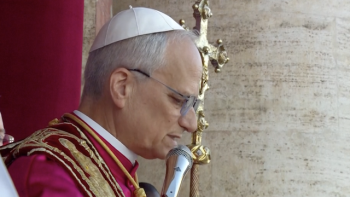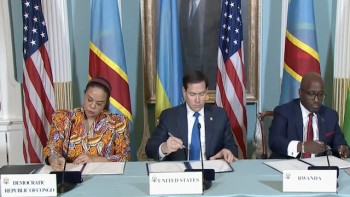Embattled President of the Democratic Republic of the Congo, Joseph Kabila, is shipping assets and family members to Cuba, sources in Kinshasa tell AfroAmerica Network. According to the sources, the assets, including money, minerals, jewry, and other expensive furnitures and personal items are being carried by plane to Cuba. The pilot or owner of the plane is known in Kinshasa as Tim, according to the sources.
Photo: DRC President Joseph Kabila's brother Zoe Kabila and Sister Janet Kabila allegedly overseeing assets being flown to Cuba.
The sources say that Joseph Kabila's actions have intensified after DRC defense minister Aime Ngoy Mukena and
Rwandan defense minister James Kabarebe met in Kigali on September 24, 2015, to renew a Secret Accord signed in 2009.
The Secret Accord has raised a general discontent among the Congolese military and political leaders. Civilians, especially those in Eastern DRC have also condemned the Accord, accusing Joseph Kabila and his Ministers of being traitors and seeking to cede Congolese territories to Rwanda.
Just a day after the secret accord was renewed, and upon assessing the extent of the popular discontent and apparently fearing potential popular uprising, Joseph Kabila immediately dismissed Minister Aime Ngoy Mukena from the Ministry of Defense and transferred him to the Ministry of Oil, replacing him with Crispin Atama Tabe.
However, the dramatic apparent public rebuke of Aime Ngoy Mukene did little to appease the popular discontent. On September 26, 2015, Thomas d'Aquin Mwiti, the coordinator of the Civil Society in North-Kivu province in Eastern DRC, an umbrella of non government organizations, condemned the secret accord between DRC and Rwanda and questioned the motives, after the DRC Government refused to collaborate with United Nations Forces of Intervention Brigade (FIB) composed of troops from Tanzania, Malawi and South Africa.
A Series of Defection From Joseph Kabila's Political Family
Then a series of high ranking ministers and inner circle members of Joseph Kabila, including his closest backer, Olivier Kamitatu, who allegedly has closest personal and family ties with Joseph Kabila himself, publicly distanced themselves from him.
Perhaps the most earthshaking event happened with the resignation of the tycoon Moise Katumbi from his position of Governor of Katanga and leader of the Joseph Kabila's political coalition, PPRD. On September 30, 2015, Moise Katumbi posted, on his Twitter account, that he had decided to distance himself from Joseph Kabila's political family because the state institutions were being turned into an autocratic system.
The latest public rebuke to Joseph Kabila's secret accord with Paul Kagame of Rwanda came from an umbrella of political parties in North-Kivu, the so-called "Coalition des Parties Politiques de l'Opposition au North-Kivu" or COPAP. In a letter signed in Goma, on September 29, 2015, by 10 political parties and sent to the DRC parliament and Special Representative of the Secretary General of the United Nations, the signatories condemn that accord, accuse Aime Ngoy Mukena of being the agent and mouthpiece of Paul Kagame and ask that he be severely punished, and call on the Congolese to organize for an resistance to Joseph Kabila's government.
The subject of the letter is, in French, " Dénonciation de la gestion ambigüe du processus de paix à l'Est de la RDC par le Government congolais face aux enjeux électoraux de 2016" or "Denunciation of the ambiguous management of the peace process in eastern DRC by the Congolese Government in regard to the 2016 electoral matters ".
The signatories include representatives of the following opposition political parties: ECIDE, UNC, MLC, RCD/KML, UDECF, DCF/N, PTC, PK, PCP, FDCD.
Accord to Hunt Down Rwandan Refugees.
The accord will allow both governments to conduct joint operations, to hunt down Rwandan refugees, repatriate those disarmed and currently regrouped in camps in Kisangani, Kanyabayonga and South-Kivu.
The initial accord was signed on February 6, 2009. Rwandan and Democratic Republic of the Congo signed the Secret Accord at the Serena Hotel, Rubavu, Western Province, Rwanda. It was the result of secret negotiations between the two governments represented by foreign affairs ministers Ms Rose Marie Museminali of Rwanda and Mr. Alexis Thambwe Mwamba, of DRC.
The Secret Accord, specifically in paragraph 8, gave to the Rwandan Special Forces working with FARDC the permission to enter the DRC territory to target Rwandan refugees, labelled "ex-FAR/Interahamwe" in the accord, and repatriate them "peacefully or forcefully, instead of allowing them to resettle on the DRC territory."
The Accord was signed when a group of Rwandan refugees had been disarmed and regrouped in Kasiki, Lubero territory, North-Kivu, by the National Democratic Congress (NDC), an umbrella of Rwandan rebel groups, within the framework of what was called Kisangani/Rome process. The Kisangani/Rome process had resulted from negotiations between DRC Government and NDC, under the mediation of Sant'Egidio Community, Eglise du Christ au Congo (ECC) and SIK-Norway. Three days after the Secret Accord was signed, the Rwandan Special Forces attacked the disarmed Rwandan refugees in Kasiki, hence putting an end to the process.
At the time, Joseph Kabila's goverment signed the Secret Agreement to bring in Rwandan Special Forces, while negotiating with NDC to disarm and regroup refugees, who included women, children and elderly. Only he and his confidents, especially the head of Military Intelligence Colonel Yav, Joseph Kabila's right and left arms, the now disgraced General John Numbi and the late Katumba Mwanke, the Security Advisor at the time, Professor Kaumba and his representatives in the Kisangani/Rome process, Ambassador Seraphin Ngwej and Bishop Dr. Kuye Ndondo.
This time, Rwandan refugees in the three camps are composed of former Rwandan rebels of the FDLR, along with their dependents. The ex-FDLR voluntarily disarmed last year and have been waiting for repatriation, resettlement or relocation.
With the accord, the Rwandan government has also agreed to repatriate the Congolese ex-M23 rebels, who were once funded and backed by Rwanda and led a bloody invasion of the Eastern DRC, before being almost decimated by the Forces of Intervention Brigade, composed of troops from Tanzania, Malawi, and South Africa and acting under the Unitted Nations mandate.
©2015 AfroAmerica Network, All Rights Reserved.
















